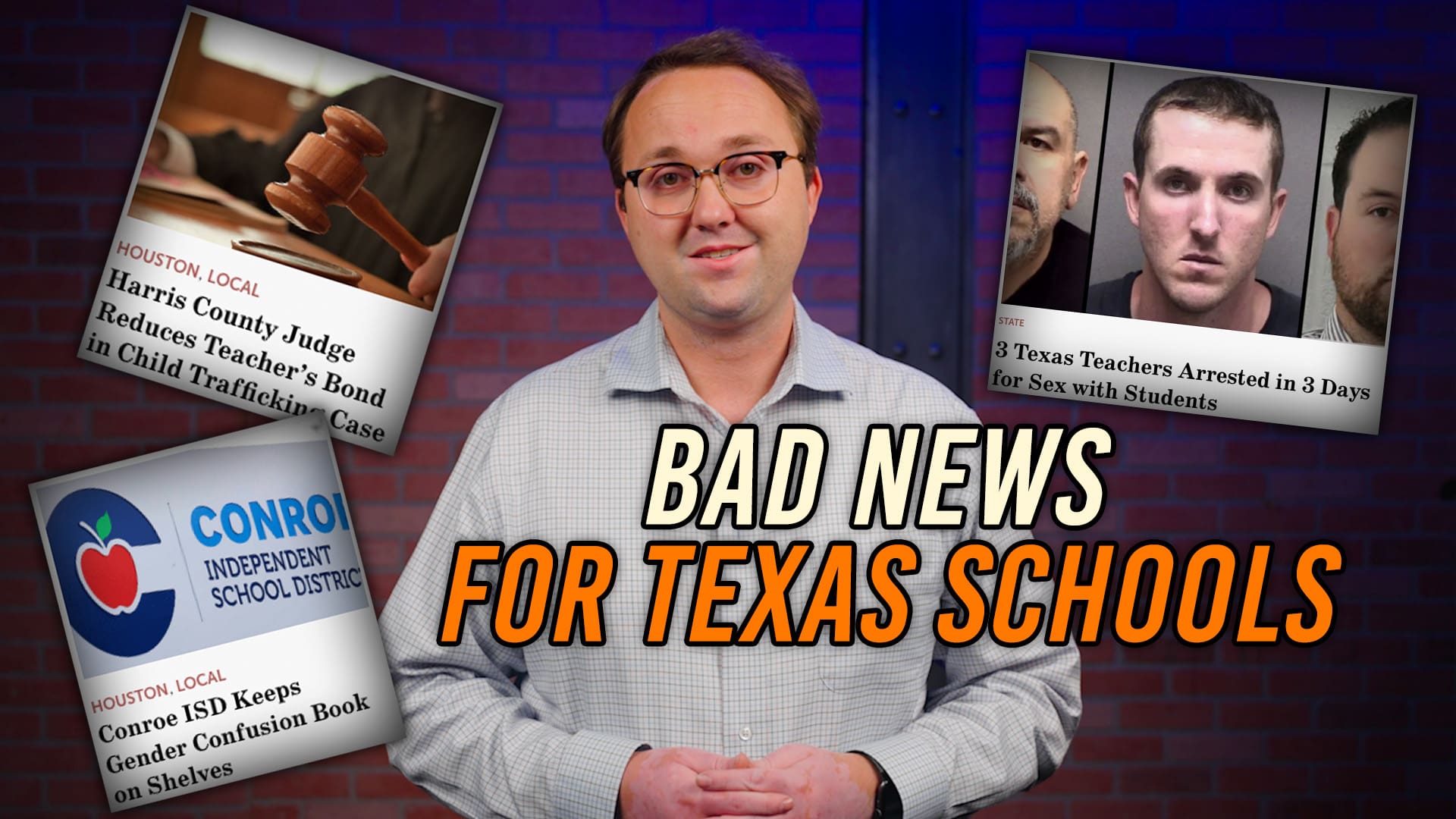Pinprick hits by state lawmakers at Texans’ property tax burden are stifled by the corrupt tax-hiking cartel of local governments and appraisal districts. Whenever the legislature goes the route of exemptions to provide property tax relief, the cartel acts as gatekeepers limiting access to this help.
The Texas Legislature has created a broken system that bleeds Texans’ wallets. According to Texans for Fiscal Responsibility, Texas’s overall property tax burden has metastasized from $10.5 billion in 1994 to $71 billion in 2020. That’s an over 560 percent increase. TFR also points out that this explosion has far outpaced population growth.
But just as spending drives tax increases, so does debt, and public servants have astronomically increased Texans’ debt load.
In their 2022 Financial State of the States report, taxpayer watchdog Truth in Accounting found that Texas remained a “sinkhole state,” needing $56.6 billion to pay off its debts. As the government only has the money it collects from taxpayers, that’s equal to $6,600 more the state would need to collect from each taxpayer to pay off. “Texas’ financial problems stem mostly from unfunded retirement obligations,” the report reads. TIA did find the “state’s financial position improved in 2021 mostly due to a great deal of federal aid and dramatic increases in the value of pension system assets,” but cautions “the state’s overall debt situation will likely further deteriorate over the coming year.”
According to The Texan, that’s only a part of the bad news. They found that local government debt in Texas has hit a total of $417 billion. The Texan calculated that equals $14,000 of debt per citizen.
All of this is on top of debts acquired by the federal government, and every single penny must be paid back by the taxpayer, on top of personal obligations.
Unless something radically changes, Texans will likely feel pain in the foreseeable future. It’s also likely, based on the actions of certain public servants, that enough Texans are feeling such a pinch that they’re crying out.
Gov. Greg Abbott has publicly called for “at least half” of the state’s over $27 billion surplus to be deployed to protect property taxpayers wallets in the form of property tax relief.
In a different direction, on November 30, Lt. Gov. Dan Patrick (R) proposed raising the homestead exemption—the property tax limitation you receive on the home you primarily reside in. While Patrick admitted that more needed to be done, adjusting exemptions is a pinprick move the legislature has defaulted to in the past.
Tim Hardin, CEO of Texans for Fiscal Responsibility, pointed out that the way these exemptions adjustments are made do not bring sustained help. “The flat dollar homestead exemption simply keeps up with inflation,” he told Texas Scorecard. “A much wiser and better way to deal with homestead exemptions would be based on a percentage basis.”
When Diane Covey, a retired Denton County taxpayer, was told about Patrick’s homestead exemption proposal, she was less than enthusiastic. “Obviously, he’s out of touch with reality,” she told Texas Scorecard. “Why hasn’t he paid attention to [property taxes] in his previous years as a servant to the community?”
Her lack of enthusiasm about exemptions appears to be well founded, based on records Texas Scorecard obtained through open records requests. These records indicate that as the system operates today, the appraisal districts stand as gatekeepers between taxpayers and exemptions.
Gatekeeping
Human beings everywhere make mistakes at one time or another. Some purposely cross the line. When either is done by those in government, the ripple effects into citizens’ lives is magnified.
Texas Scorecard sent an open records request to the Texas Department of Licensing and Regulation (TDLR) seeking records of complaints against Chief Appraisers of appraisal districts. The time frame was January 1, 2016 until December 31, 2021. Within the received records were complaints involving exemptions.
A complaint filed against the Chief Appraiser of the Culberson County Appraisal District notes that he had “not updated the new owner, address and exemptions” for the complainant, despite having sent “documentation showing they are the new owner of a property on two separate occasions.” This case was listed as “informally resolved” as of November 30, 2021.
A similar complaint about exemptions was filed against the chief appraiser at the Fannin Central Appraisal District. “Complainant alleges the respondent is not providing their homestead or the Texas wildlife exemptions each year, as well as increasing their property taxes by three times the amount after building a metal structure on the property,” the complaint reads. “Complainant believes the tax assessor and chief appraiser are unhelpful, rude and treating the property owners in Fannin County unfairly.” This was forwarded to prosecution on February 1, 2022, with the violation listed as “unfair treatment of taxpayer.” The case was listed as open when Texas Scorecard received this record.
While that was a case of a taxpayer complaining a chief appraiser was the reason he was not getting his exemptions, another complaint in the Navarro Central Appraisal District alleged a chief appraiser had abused her power to engage in self-dealing.
“Complainant alleges they were employed at the CAD and knows that the Chief Appraiser- Karen Morris, manipulated her own property values and had other employees put exemptions on her property that are not valid,” the complaint reads. It goes on to state the complainant alleges he or she was “verbally attacked by Karen Morris and Kelly Lawhon- forcing complainant to quit, did not receive her last paycheck, was denied unemployment and have received threats from the CAD to put a lien on their home.”
The case was listed as open when Texas Scorecard received this document, and was forwarded to Prosecution on October 23, 2020.
The record of complaints against chief appraisers the Texas Department of Licensing and Regulation (TDLR) delivered to Texas Scorecard total 27, with the most recent action taken in 2022. The complaints are over a variety of issues, including abuse of power, incorrect appraisal valuations, and imposing requirements. Of the 27 cases, two were “informally resolved,” 16 were closed due to “insufficient evidence,” but seven were forwarded to prosecution. The listed violations for the forwarded cases were “unfair treatment of taxpayer,” or “violated code of ethics.”
According to state law, chief appraisers report to the appraisal district board of directors. As previously reported, board members are appointed by the local governments within the area.
Texas Scorecard requested and received an updated spreadsheet containing complaints from January to December 14, 2022. This spreadsheet shows 26 complaints filed during that time. All cases were listed as open as of when Texas Scorecard received them.
One of the complaints listed is against Randall Armstrong, the bureaucrat at the Tarrant Appraisal District who wrongly targeted property tax fighter and realtor Chandler Crouch last year. Two complaints were filed against TAD Chief Appraiser Jeffrey Law. As Armstrong is listed here and he is not a chief appraiser, it is therefore unclear if everyone on this list is a chief appraiser or not. Texas Scorecard asked TDLR for clarification about this spreadsheet. No response was received before publication.
Multiple different types of allegations are made in this record against appraisers across Texas, including violations of state law, “doctoring evidence in arbitration hearings,” telling appraisal review boards “not to consider evidence that was provided,” and lying during appraisal review board hearings. One anonymous complaint in Madisonville alleged abuse of power and self-dealing within the appraisal district. “Complainant states the 2021 home values rose nearly 50% and the respondent lowered the pricing of their home to save themselves money.”
Taxpayers also cried out about exemptions in complaints against appraisal districts and appraisal review boards. Texas Scorecard received these records as complaints the Texas Comptroller collected from Tax Liaison Officers at appraisal districts across the state.
“In November 2018, I found out that the ownership of my property [REDACTED] was transfer[red] into a Susan Tucker Trust back in 2015 by someone with the Appraisal District. With this my homestead exemption was removed causing me some tax issues,” Synthia Henry, a single parent with one source of income, complained in February 2019 against the Travis Central Appraisal District. Henry’s complaint is one of 23 comments against TCAD and the appraisal protest system that year, but this is probably a fraction of the discontent present.
After some work she was able to get this resolved, but she still suffered. “My escrow was almost 3k in default for 2018. This caused an increase of over 400 in my monthly mortgage for 2019. This is money that I don’t have.”
The problems at Travis CAD didn’t stop, as a complaint from Manuel Muro from April 2021 shows.
“I am writing this out of frustration with our tax situation, which stems from our exemptions disappearing when we refinanced our mortgage in November 2019.” When Muro contacted the appraisal district, he didn’t receive quality customer service. “When I called TCAD this morning and asked how this happened, I was told, ‘sometimes this happens,’” he wrote. “When things like this happens[sic], it hurts real people. Because of the exemptions disappearing, the Travis County Tax Office sent the tax bill to the mortgage company that doubled our taxes. Because of that, our escrow had a negative balance that we had to repay out of our savings.”
My wife and myself are elderly and on a fixed income, and this is a real hardship. Also I had a heart attack and stroke recently and don’t need the stress. I had to reapply for the exemptions, which was backdated to 2019, which were approved.
Muro’s complaint was one of 13 complaints that year about the appraisal system and protest process at Travis CAD. This is probably a fraction of the discontent present, and it isn’t isolated.
In his 2016 complaint against the Tarrant Appraisal District, tax agent Steve Dunson noted that the account numbers for properties whose taxable value he was protesting were changed. The agent wrote that the over-65 exemption was not transferred from the property’s old number to its new number. In addition to that, the protest was filed on June 1, 2015, but the tax agent complained there was no hearing until April 18, 2016. Dunson’s complaint was one of 17 complaints against TAD and the protest process that year. This is probably a fraction of the discontent present.
Exemptions issues also showed up in Lt. Gov. Patrick’s traditional base of power: Harris County.
In an August 2021 complaint against the Harris Central Appraisal District, a property owner contacted a county commissioner because her homestead exemption was canceled for the 2020 tax year. “The Confirmation Card was returned to HCAD by USPS. Requalification documents were mailed. [The] owner did not respond,” the complaint read. The Tax Liaison Officer contacted the owner and was able to help get the exemption reinstated.
There’s also a January 2021 complaint involving a veteran. “I feel like vets should receive more information from [Harris Central Appraisal District] explaining the procedure for applying for disability exemptions,” wrote the complainant. It’s documented in the complaint that the local Tax Liaison Officer assisted the veteran in using the website to access and complete required forms.
Finally, an October 2021 complaint against HCAD came from a nonprofit, proving how overly cumbersome and bureaucratic property taxes are, and the fight to get exemptions. “Executive Director of a nonprofit was upset that an addition to previously exempt property was not exempt ‘automatically,’” the complaint read. “Such properties must be the subject of an application and approval process to be granted exemption. Once the applicable tax law was explained by the TLO she provided the necessary application and support documentation.”
These three complaints are among 64 within the spreadsheet tracking “comment[s] or suggestion[s]” regarding the Harris CAD or the protest system. Complaints within this spreadsheet is probably just a fraction of the discontent present.
Problems with exemptions even showed up as far out as the Nueces Central Appraisal District area. In October 2021, a property owner named Moore “QUESTIONED WHY [the homestead] EXEMPTION HAD NOT YET BEEN APPLIED TO PROPERTY.” He was referred to the exemptions department.
This complaint was in a spreadsheet containing 11 “comment[s] or suggestion[s]” regarding the Nueces CAD or the protest system. The complaints within this spreadsheet is probably just a fraction of the discontent present.
The fact that taxpayers are made to jump through hoops for exemptions makes it appear less attractive as a means for getting real relief to taxpayers.
“I would even argue that it should be automatic for people,” Texans for Fiscal Responsibility CEO Hardin said of the homestead exemption. “You shouldn’t even have to apply.”
Complaints are one thing. Actual records of exemptions being removed or denied is another.
Hard Evidence
As a test case, Texas Scorecard sent an open records request to the Bastrop Central Appraisal District (Bastrop CAD), located roughly 33 miles southeast of Austin. In response, Bastrop CAD sent records of rejection letters they had sent to those seeking exemptions for their properties. In 2021, they fired off 303 such letters to property owners.
Seventeen spreadsheets for multiple months in 2021, from July to December, revealed the names of the property owners and the reasons for the denial. Texas Scorecard redacted personally identifiable information within these spreadsheets before uploading.
In a September 24, 2021, spreadsheet, the vast majority of the reasons given for the 45 denial letters was “no response,” whereas the rest consisted of “Deed Date,” “Acreage Denial,” “Disability Date,” “Deed Date,” and “Insufficient Information.”
A spreadsheet dated August 20, 2021, saw similar reasons given for the 73 denial letters fired off to property owners. “No Response” again was a common one, but new reasons popped up in this spreadsheet, including “Award Date After Jan. 1st.” “No structures,” “Not Owner,” “LLC,” “Applicant Not Owner,” “Rental,” “Previous Owner Exemptions,” “Not Occupied,” and “Not Heir”.
A July 30, 2021, spreadsheet reported 38 such letters sent by Bastrop CAD. This report does not list “No Response” as a given reason. Instead, “Deed Date” pops up the most, with five reports of “Not 65 Yet.”
Texas Scorecard also obtained from Bastrop CAD exemption denial letters they had sent in 2020, detailing the reason for the denial.
The appraisal district sent an August 2020 letter to Judy Mogonye, notifying her that her application for the 2020 homestead exemption, and the Over-65 exemption, was denied. Why? Because she didn’t reply to an email they had sent to her.
As previously reported, within the records Texas Scorecard received from the Texas Comptroller were multiple complaints from taxpayers that they never received notices from their appraisal district. “The vast majority of Texans who own single family dwellings are homesteaders,” Hardin said. “Why would it be an opt in? It should be an opt out.”
Mogonye wasn’t the only victim of this either. Bastrop CAD sent a letter that same month and year to Sally & Hugh Hanan, also informing them the appraisal district had denied their 2020 homestead exemption and Over-65 exemption application. The reason was the same as Mogonye: not responding to an email. Bastrop CAD sent a denial letter to Rebecca Roberts regarding her 2020 homestead exemption for the same reason.
Different reasons popped up in other letters.
Bastrop CAD told Allison & Michael Chase that state law required they could only receive the homestead exemption on what is their primary place of residence as of the beginning of the year. “Our records show your deed date to be April 17, 2020.”
Also included in the records Bastrop CAD sent Texas Scorecard were spreadsheets that contained a list of accounts that filed appeals that had checked the box “Exemption was denied, modified, or cancelled[sic]” for 2020 and 2021. “Most tax agents check this box just to cover themselves without regard to whether the property already has exemptions in place or the property owner has not/will not qualify. We have no way of sifting those properties out,” Bastrop CAD wrote Texas Scorecard in an email.
According to these records, in 2020 there were 58 protests filed that had checked the exemption denied, modified, or canceled box. A year later, that increased 115 percent to 125.
Texas Scorecard uploaded redacted copies of these records to protect the private information of these property owners. The 2020 spreadsheet shows most of the property owners were Limited Liability Corporations, but in the 2021 spreadsheet there appeared to be more individuals feeling the need to file such protests.
A Broken System
Even if appraisal districts perfectly applied all exemptions available to property taxpayers, it still doesn’t come close to fixing the problem. “I think the major deficiency with any exemption increase proposal is that it doesn’t bring about the sort of structural reform that conservatives want to see,” said James Quintero of the Texas Public Policy Foundation. He mentioned that most voters recently opted to increase the homestead exemption for school district property taxes from $25,000 to $40,000. “Now for the average taxpayer that netted he or she about $176 of annual savings. So not a lot of money for that $15,000 increase.”
Quintero cast doubts about the effects of increasing the exemption again from $40,000 to $60,000. “It will probably net a savings of a similar size, call it 200 bucks, maybe. It’s not going to be enough to really provide the level of relief that most taxpayers are expecting.”
Economist Vance Ginn, president and founder of Ginn Economic Consulting, did not mince words about Texas’ tax-hiking cartel. “It’s a broken system that ends up harming the lower income folks the most, and it’s contributing to the affordability crisis that we’re having across the state,” he said.
Texas Scorecard sent an inquiry to Lt. Gov. Dan Patrick’s office about appraisal districts gatekeeping exemptions. No response was received before the given deadline of January 5.
On January 9, the day Texas Comptroller Glenn Hegar provided an update of the total surplus of taxpayer dollars collected for the 2023-2024 biennium, Patrick issued a statement. “We will introduce our budget in the coming days. As I stated previously in my November press conference, Texas taxpayers must first receive tax relief before we commit to any new spending,” he wrote. “Additionally, we must not spend all the money. We must keep a responsible reserve in case Joe Biden’s inflationary policies and out-of-control spending causes a national recession in 2023 and 2024.”
In Part 4 of this series, Texas Scorecard will explore what will liberate taxpayers from the cartel and provide true relief.





